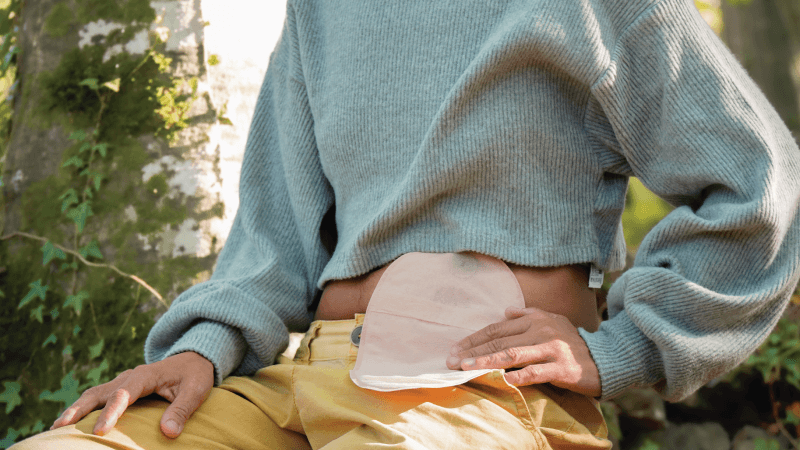What to Expect After Stoma Surgery

Written by Sophie Bebeau on Thu Mar 02 2023.

It's normal to feel nervous before stoma surgery. It is a major procedure that will require recovery, and it can be daunting for the patient and their caregivers. Understanding what to expect post-surgery can help soothe pre-surgery anxiety and make the recovery process smoother.
Here's an overview of stoma surgery and a look at what you need to know about recovering from stoma surgery from the moment you wake up to the moment you head home and begin your new life with a stoma.
What is Stoma Surgery?
Stoma surgery is done either laparoscopically, which involves creating several small openings in the abdomen, or through a traditional open surgery with a large incision. Whichever way it is performed, the surgery involves making an opening in the stomach where waste can pass out of the body. The surgeon will make a small incision in the abdomen and create an opening known as a stoma. The most common reasons for having this type of surgery are ulcerative colitis, cancer, or Crohn's disease.
There are three types of stoma surgery (known as ostomy surgery).
Colostomy: Part of the colon is brought through the abdomen to create a stoma.
Ileostomy: Part of the ileum, or small bowel, is brought through the abdomen to create a stoma.
Urostomy: The bladder is removed or bypassed, and a stoma is created from a small piece of the ileum.
The idea of undergoing surgery can feel scary, but stoma surgery is relatively uncomplicated, and with the right aftercare and management, patients usually feel fully recovered after two to three months.
Your Hospital Stay After Stoma Surgery
After surgery, you will stay in the hospital for three to 10 days, depending on your general health and how your stoma is healing. Once your stoma is confirmed to be working properly and you feel comfortable and ready to take care of it, you will be able to leave the hospital.
When you first wake up after surgery, you'll likely feel a little groggy or disoriented because of the anesthesia. You may also notice that you are hooked up to different IV drips and drains. These are normal and should not cause you any discomfort.
What Will My Stoma Look Like?
Directly after surgery, your stoma will be moist, swollen, and a darker red color. You can expect swelling to go down after 6 to 8 weeks. The stoma will begin to fade into a light pink or reddish color, similar to the color of the inside of your cheeks inside your mouth.
Will it Hurt?
While you may feel some pain related to the surgery, the stoma itself will not hurt. Stomas have no nerve endings, so you won't ever be able to feel any sensation or discomfort in the stoma. It is common for a stoma to bleed a little bit when cleaned, but again, you will not feel any pain.
When you wake up from surgery, you will probably feel some normal post-operative pain and bloating. You may be given a PCA pump or a patient-controlled analgesia pump. This pump is hooked up to an IV that is attached to your body and has a button that you can push to deliver IV pain meds. Some patients find they can manage pain with just oral pain medications. Post-operative pain will subside quickly; until it does, your medical care team will ensure you are as comfortable as possible.
When Will My Stoma Start Working?
Your stoma will begin working within just a few days. It will be attached to a clear ostomy pouch directly after surgery so that your medical team can see when it begins producing output and easily see how much it produces. This bag will not be the same type of bag you'll use at home in your daily life.
Your first few outputs will probably be a little unpredictable because your colon is still adjusting to its new way of operating. Stools will likely be loose or watery, or you may experience constipation, bloating, and gas. All of this is normal, and your body will become more consistent as you heal over the next few weeks. You can encourage faster healing and more consistent output by taking short walks during your hospital stay.
Before Leaving the Hospital
You will probably be a little nervous about leaving the hospital and starting to live your new life with a stoma. But rest assured that your medical team will ensure you feel comfortable caring for your stoma before leaving.
A dedicated ostomy nurse will work with you well before stoma surgery. An ostomy nurse is a nurse who specializes in caring for, educating, and supporting patients with stomas. Your ostomy nurse will be an invaluable resource for you and help you learn everything you need to know about caring for your stoma before leaving the hospital. Some topics you can expect to cover with your ostomy nurse include:
Regular care for your stoma and the area around the stoma
Different types of ostomy equipment and accessories
How to change your ostomy bag
How your digestive system has changed
How to deal with gas, leakage, skin irritation, and other common stoma issues
dietary recommendations
What kind of activities you can do as you recover
How to assess the stoma for issues that would require medical attention
How to cope with regular day-to-day living
How to cope with the emotional challenges that may come with having a stoma
Recovering After Stoma Surgery
When you are cleared to go home, you should continue your recovery with lots of rest, hydration, and short walks to help build strength back. Remember to be patient with your body. Your digestive system has just been through a major shock, and it's okay to take things slow.
What Can I Eat?
Your diet will likely need to be adjusted for the first few weeks after surgery, but once you are fully recovered, you can go back to your regular diet and eat the food you enjoyed before your stoma surgery. Before you leave the hospital, your ostomy nurse will provide you with a list of recommended foods to eat as you recover.
Can I Exercise After Surgery?
Try to take a few short walks each day and do not do any heavy lifting before 8 weeks of recovery. Do not do intense exercise until your doctor gives you the green light, usually after 12 weeks. When you have fully recovered from your ostomy surgery, you should be able to resume a regular exercise routine.
Other Activities After Surgery
You will likely be unable to drive for about 6 to 8 weeks. Talk to your doctor to get approval to drive again. This will usually be after you feel like you can safely make an emergency stop.
You can usually engage in sexual activity after 3 to 4 weeks with your doctor's approval. Some adjustments will be needed as you get used to your stoma, but ostomy bag users can have normal and fulfilling sex lives. Women with ostomies can still get pregnant and have normal, healthy pregnancies with no greater risk than any other mother.
Learning How to Live With Your Stoma
Most people with stomas report a steep learning curve during the first couple of months with their stoma. Be patient with yourself and lean on your family, friends, and your ostomy nurse for support. There is a lot to learn about your new life with a stoma!
Feeling confident and comfortable changing your stoma bag will come with lots of practice and will soon be a normal part of your daily routine. For more detail on changing your stoma bag, check out our article about caring for your stoma with a step-by-step guide for stoma bag changes.
As you adjust to daily life with a stoma, you'll become more comfortable and confident each day. Soon you'll have a handle on what works best for you when it comes to stoma care, diet, exercise, and all the other activities of regular life.
Coping with Emotions After Stoma Surgery
While your body is adjusting to its new setup, your mind will need time to adjust too. It's very common for ostomy patients to feel a mixture of sadness, grief, anxiety, relief, and excitement. Stoma surgery marks a big life change, and as with any big life change, it will take some time to work through the emotions that come with it.
Remember not to suppress your emotions. Expressing how you feel is healthy and part of the healing process. Lean on family and friends for support, and consider scheduling appointments with a therapist after stoma surgery to help you work through your feelings.
Many ostomy patients also report huge benefits in connecting with other ostomy patients or "ostomates." Finding an ostomy support group can make a huge difference in how you feel about your stoma. Talking with others who live with a stoma can help make it feel more "normal," and you can swap lifestyle tips, stoma stories, and make wonderful, supportive friends.
Use the United Ostomy Associations of America's Support Group Finder to locate groups in your area.
Need More Information?
Check out our Beginner's Guide to Ostomy Systems and How to Care for a Stoma for more stoma care tips.
If you need help choosing the right ostomy care equipment and accessories, talk to a Care Specialist at Carewell. We talk to thousands of ostomy bag users every year and are happy to help you figure out the best products for your needs.
We are available and are happy to answer your questions and make recommendations. Reach out to our Care Team by calling (800) 696-CARE, emailing support@carewell.com.
Other Articles You May Like

Best Colostomy Bags of 2025
The important questions to consider when selecting a colostomy bag are: Is it a one-piece or two-piece? What size is it? Is it reusable or single-use? Is it trim to fit or is it single fit?
See the Best Colostomy Bags >
Ostomy Checklist: 15 Crucial Supplies for Those with a Stoma
For individuals managing a stoma, having the necessary supplies organized and accessible is key. A complete ostomy kit can make a significant difference in daily comfort and minimize the risk of complications. To help you prepare, we've created an all-inclusive checklist of must-have items.
Read More >
Sophie Bebeau is a writer, graphic designer, poet, and multidisciplinary artist living in Green Bay, Wisconsin. When she’s not writing or making things for the internet, she can be found cross-stitching, writing poetry, and snuggling on the couch with a cup of tea and her husband, son, and dog, Buttercup.